Dr. Robert S.”Bob” Zeigler is an internationally respected plant pathologist with more than 30 years of experience in agricultural research in the developing world, most of them involved with rice. He has been the director general (DG) of the International Rice Research Institute (IRRI) for the last 10+ years—the second longest tenure after the Institute’s founding DG, Robert F. Chandler, Jr. (1960-72). As DG, Bob set the Institute’s strategic direction and he has also been a passionate spokesperson on a wide range of issues that affect rice growers and consumers worldwide.
Proclaiming himself an introvert, he gave this IRRI pioneer interview, conducted in his office at IRRI headquarters on 28 August 2015. With his customary wit and candor, he discussed his life both before and during his professional career, which has spanned time in Africa, Latin America, Asia, and the U.S. He retires on 11 December 2015.
The selected excerpts here are just the tip of the “riceberg.” In a “Historian’s Cut,” Bob’s complete 4-hour interview is available. It features anecdotes about polar bears and all-meat dinners above the Arctic Circle, studying forest fires in Crater Lake National Park, what gives him goose bumps, and the wheels of the brilliant machine that is IRRI. He also gives frank opinions and views on a wide-ranging set of topics—including Golden Rice, IRRI’s proud Filipino roots, the funding roller coaster, the plight of smallholder farmers, the role of women, the humbling experience of working with national programs, the Svalbard Doomsday Vault, climate change, growing up Catholic, advice for the incoming DG, and much, much more.
Agricultural beginnings on Pennsylvania dairy farms
When I was a kid, both my parents came from dairy farming families. My father’s farm was in southeastern Pennsylvania; my mother’s in the southwestern part of the state. I was mostly influenced by my mother’s side of the family. They were pretty much very small dairy farmers, scraping to get by. I didn’t realize that they were very poor. The men worked in the bituminous coal mines of Cambria County.
A fourth grader’s wish: to be a mad scientist
Science always grabbed my attention as a kid. I was probably just wired that way. I loved plants. My earliest memories are of me working with my mother. She always had a vegetable garden and I just loved it when the plants came up, especially the first flowers in the spring. It just gave me a sense of indescribable joy and a love of nature, life, plants, and gardens that I have to this day.
That led to a curiosity that transferred into science. I liked the 1950s’ science fiction movies such as The Killer Shrews and The Bride of Frankenstein. And, there were the comic book superheroes such as Superman, Batman, and the rest. They had in them the good and the evil of science wrapped throughout. I took the good and thought it was exciting. This was pretty instrumental in shaping how I view the world. The mad scientist role was a career model. I could be a mad scientist!
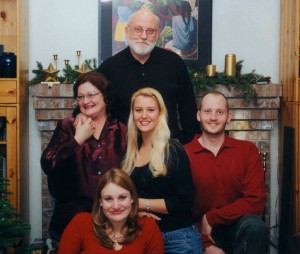
Biology was mind-blowing
After my family moved from Pennsylvania to Illinois, I attended Urbana High School, where I was exposed to biology in a way that was just mind-blowing. I loved it. I really got turned on by science in an academic way, as opposed to the mad-scientist comic book/science fiction movies. It helped change how I saw things in the world.
Based on what I did in high school, I enrolled at the University of Illinois, where I ended up in an Honors Biology Program that really changed the course of my life. It was not the general premed biology class with 300 students: eight or ten of us were taught by four professors. I was attending a large land-grant university with thousands and thousands of students. However, it was akin to a school like Harvard with small classes and outstanding teachers.
I took a plant ecology field trip to Mexico and was blown away again. I had never seen the ocean before. Mexico showed me a different culture with snow-capped mountains and tropical beaches. In the cities, I could drink beer even though I was only 20 years old. I didn’t have to worry about an ID; fantastic food—my God, I thought I’d died and gone to heaven! I came back from that trip transformed.
My professors urged me to go into molecular biology, as that was the clear wave of the future. I thought about it, but the study of ecology better captured my love of nature. So, I did the opposite of what they advised! As a result, I joined the Peace Corps in 1971 and was sent to Africa—specifically, the very remote Congo (Zaire back then) because of my knowledge of French.
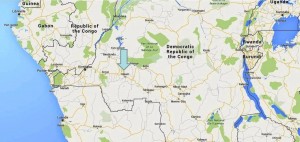
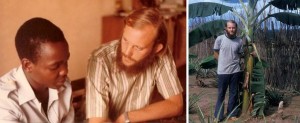
Peace Corps stint cultivates interest in
plant disease
In the Peace Corps, I taught (in French) high school math, chemistry, physics, and biology at a little school, Collége Musim, in Bandundu Province about 200 kilometers north of Kikwit [arrow on map]. If you “Google” Kikwit, the first thing you find is the Kikwit strain of Ebola, which was 24 years after my time. I loved living in fascinating rural Africa.
A transformative event was an outbreak of bacterial blight that wiped out the cassava crop [the third largest source of food carbohydrates in the tropics, after rice and maize]. The main food for the people in my area was wiped out. This was causing local starvation. We had to close our school; there was not enough to feed my students. It really struck me that a plant disease, hitting a staple crop, could have such impact and nobody could do anything about it.
Later, when I was a graduate student at Oregon State University, I took a forest pathology course; I wanted to study the interaction in the forest of dwarf mistletoe parasitism, fire, and pine forest community dynamics. This continued my turn-on to plant disease. The complexity of plant disease in ecosystems, my exposure to its impact on cassava, and the real eye-opening experience of living and working in a developing country [through the Peace Corps] all directed my career from then on.
No ambition to be a director general
It’s funny. I never, ever had an ambition to be a director general. I, like most young, hungry scientists, loved nothing more than to make fun of the DG and to complain. My God, what we said: “Obviously, the director general does not know a damn thing; what is he thinking, etc.” I was very much an iconoclast who felt that people in authority were pretty much incompetent and didn’t know what they were doing. I made no secret about it and said it quite openly. Surprisingly, I still had a job [as a plant pathologist at both the CIAT (International Center for Tropical Agriculture) in Colombia and IRRI].
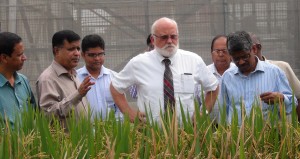
The first time the notion of being a DG was mentioned to me was in this office. I was giving my exit interview to Ron Cantrell [then IRRI DG, 1998-2004]. I was going off to Kansas State University to head the Plant Pathology Department. I didn’t think I’d ever be back in an international center again. I thought I’d be moving into U.S. academia, focusing on agriculture there. Ron mentioned in passing that he saw a great future for me and, some day, I could even be sitting in this chair. I thought, “What, are you crazy?”
At that time [1998], CGIAR DGs were gods and I certainly didn’t have any god-impression about myself. But, lo and behold, 6 years later, I was heading the CGIAR’s Generation Challenge Program based at CIMMYT [International Maize and Wheat Improvement Center in Mexico]. There, a colleague who was a good friend of Ron Cantrell, told me that Ronnie was resigning from IRRI and that he and Bob Havener [former IRRI interim DG in 1998] said they thought that I’d be one of the strong candidates for the position. To make a long story short, it ended up being me. But it’s something I never sought.
Not “one of the boys” anymore
I was certainly one of the boys when I was here [as plant pathologist at IRRI, 1992-98]. In those days, we had some wild, raucous times that will be best described by others.
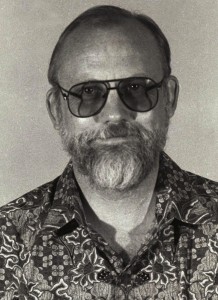
There were advantages and disadvantages in coming back [as DG] after being away 6‒7 years. An advantage was that I knew rice. I am the only director general of the Institute who actually has had a career in rice. I understood the rice plant; I understood the challenges around rice biology, agronomy, and crop protection. I’ve always had an interest in social sciences. I had an administrative career in rice at CIAT and at IRRI. I also had a pretty good appreciation of the culture of IRRI. I knew ALL of the tricks that people pull on senior management because I had pulled them all myself in previous incarnations. I had a good relationship with most of our partners across the region. I had a real appreciation for real potential for rice in Africa.
One disadvantage: I was friends with people [from the previous stint at IRRI] and that friendship could get in the way of doing my job—and that was really hard. I had to let people go who I used to play tennis with and socialize with. That’s no picnic. Likewise, the direct expectations from me that people could draw on a past relationship to get favors done made me uncomfortable, to put it mildly. It was particularly hard for my wife. There were expectations that we could magically transform real problems or challenges at the Institute with the snap of a finger. One real education for me was how bureaucracies have a life of their own. More importantly, problems in an institution are never in isolation. Almost always, they are interconnected with more fundamental or structural problems. Hence, no quick fixes.
I tried my very best to make sure that the Institute itself, not the DG, is as sensitive and responsive as possible. One of the things I tried to do, and I hope I’ve been somewhat successful, was to take the personality cult, the “god” cult, out of the director: that we talk about the institution and not the DG.
National and International staff—wheels of a brilliant machine
I don’t want to say anything that sounds like a platitude, but I don’t think there is any question that the greatness of IRRI is due to its Philippine national staff (NRS). The contributions of the NRS are incomparable, just incomparable. IRRI discovered a model that I didn’t fully appreciate until last year (after 9 years of being DG and 7 years additional as scientist in the past). IRRI created and discovered this model completely by accident. I was reviewing with Christine Croombes [director of IRRI’s Human Resource Services] our staff profiles. We noticed that the turnover time of international staff (IRS), on the average, is about 7 years and turnover time of the NRS is closer to 20 years.
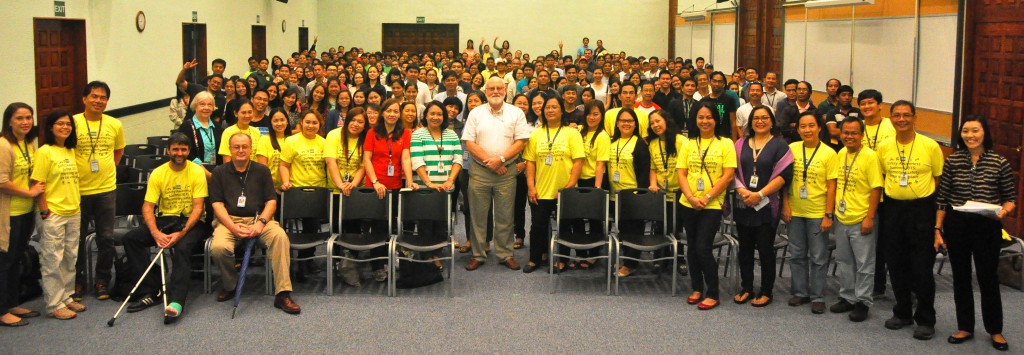
It just clicked in my mind that we have a machine that is moving forward with different parts turning at different speeds in that we have IRS turning at a much faster rate, bringing in new thinking from outside via postdocs and entry-level scientists. They come for 7 years or so and move on—maybe they come back later, maybe they don’t. They come in, constantly injecting new ideas.
We have another part of the machine that is turning over much more slowly. It’s taking up that knowledge and innovation that is coming in from the young international scientists, but containing and retaining the past experience and accumulated knowledge. That system—of interaction and timing involving the NRS having the institutional memory, the experience, the knowledge of the historical nature of an experiment, and the context within which we are working and constantly interjecting and interacting with new scientists coming onboard—is a brilliant model of renovation, rejuvenation, and conservation. You couldn’t have designed a better system. But it wasn’t designed; it was pure luck. But it is a brilliant, brilliant mechanism. I think among so many other things, this explains much of IRRI’s great success. It’s that contribution, the commitment, the devotion, and the longevity of the NRS with the excitement and innovation of new IRS coming and going. It’s quite a feat and I’ll have to think about it some more and get some numbers behind it and maybe write it up.
As I said, this is an insight that hit me just a year ago. It’s like one of those blinding scientific discoveries—you go ohhh, of course, it is so obvious, but know nobody has said that before. That nature of IRRI and its success are utterly dependent on that model. But that model would never work without the Filipino culture, its tremendous work ethic, tremendous loyalty, tremendous sense of family, and tremendous sense of community and commitment.
Greatest challenges as IRRI chief
Convincing donors to contribute. One strength is the unassailable nature of IRRI’s mission. Keeping in mind what IRRI is about, why we’re here, our track record, and our ability to contribute made dealing with the challenges much easier. There are the usual challenges: one—making sure that the money comes in. I still love explaining to donors how important rice is and what IRRI’s role is in the future of the world and what we have to contribute.
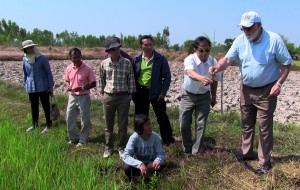
CGIAR nightmare. The CGIAR brings out the worst in people. Some people you deal with one on one are really nice, serious, and dedicated. But, when you get them into the context of the CGIAR, they’re just horrible, myself included. I think I turned into the meanest SOB you’d never want to meet when I put on my CGIAR hat. I never thought about it in those terms until right now. This morning, I had to write a message related to the CGIAR that I didn’t want to write. I just find myself, in many cases, having to deal with people who somehow survived in positions way beyond their capacity. It’s just one endless stream of frustrations. That’s a real big challenge—to stay positive and keep IRRI working and moving forward in the CGIAR environment, which in many cases is toxic.
Being an introvert. There is the challenge of me being an introvert. I am generally happier by myself. People may be surprised about that, but I’m a very strong introvert. Meeting the challenge of being outwardly projecting was something I had to learn, including being gregarious and dealing with people in social situations. Handling difficult personnel problems was always a big challenge for me.
Discovery—one of the greatest joys
Oh the discovery! Realizing that you found something new is a thrill that can’t be described. I’ve worked on hoja blanca virus, bacterial pathogens, the Pseudomonas complex, and blast disease. In each, I like to think I made some significant discoveries and advances. The realization, when it hits you—that you have an insight that explains something that was unexplained before—there’s nothing like it. It’s a rush, I mean goose bumps; hair stands on end! It’s just a thrill. I think any scientist will tell you that ecstasy of discovery—of enlightenment—when you have that flash of understanding—is indescribable. I had a few of those and, my God, they’re something else. Personally, it takes your whole being to a new level.
As a director general or research manager, I found it equally exciting to take pleasure from other people’s discoveries and breakthroughs, be it the SUB1 gene [for flood tolerance], advances with C4 rice [transferring the photosynthetic efficiency of maize into rice], or new information coming out of our long-term trials [Long-Term Continuous Cropping Experiment].
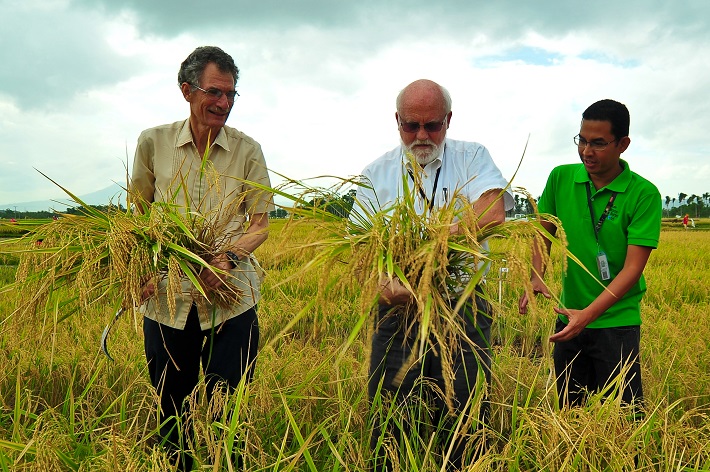
No apologies for the Green Revolution
I believe that those who developed the modern rice and wheat varieties in the 1960s and ’70s and then recommended routine pesticide applications, etc., did not know that they were advocating bad practices. In that sense, an apology is not necessary. You make an apology for things that you do wrong when you knew they were wrong. And you judge the actions of people in the context of their time. We certainly openly recognize it was a mistake and we have learned from it.
If you look at how IRRI’s research program has evolved from that learning, early on, we started to question the impact of those early Green Revolution practices and took corrective action. This resulted in ground-breaking studies on the biosphere within the rice paddy, arthropod complexity, and the impact of insecticides.
Do we regret? I don’t know. It was a different time and place. It’s pretty hard to second-guess these kinds of things. Apologize? No! Recognize that those practices were destructive to the environment? Absolutely. Make sure that the same thing doesn’t happen again? Absolutely. Be watchful and vigilant of those who misuse tools for short-term gain? Absolutely.
IRRI’s big challenge
The big challenge will be how we relate to the private sector. There’s no question that the private sector is increasingly interested in rice and it’s going to be our challenge to maintain our public institution persona while taking advantage [of the situation]. I think it’s our job to co-opt and help direct the way the private sector moves in a way that the maximum number of people benefits—the small farmer, medium-sized farmer, poor middle class consumers—all of them will benefit from IRRI’s work. We have the ability to manipulate how the private sector interacts. We have the ability to help countries come up with policies that maximize the impact of our work. That’s the challenge of the Institute.
I’m quite optimistic that the Institute will continue to be relevant and when I take my last breath—whenever that is—IRRI will still be a strong and relevant institution. These are exciting times to be a part of IRRI, be a part of rice research; no doubts in my mind about that. I’ve been UNBELIEVABLY fortunate to have been a part of IRRI for almost 18 years. For seven of them, I had a real job as a scientist. And over 10 years as director general, I consider that a blessing. How I came to achieve it or deserve it, I’m not going to ask any questions, but I’m deeply grateful for the opportunity
Being at the helm of IRRI—no other job like it
The IRRI experience is number one in my career—without a doubt. The job as IRRI director general is unlike any other job you can ever possibly want. Science, its value in human terms, the impact you can have positively on the environment—you can transform the way the whole planet will function decades from now, a century from now. What happens at IRRI is relevant.
My God, you can’t ask for anything better or more humbling. If you are at IRRI and you work hard, do your best, you will never have to worry about wasting your life. Every morning, when you look in the mirror, you won’t regret what is looking back at you. That’s worth a hell of a lot!
After more than 22 years at IRRI, Gene Hettel, editor-in-chief of Rice Today and IRRI historian, also retires shortly after Dr. Zeigler. Read more about IRRI’s rich history.


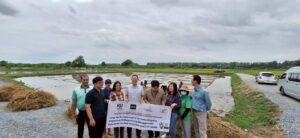
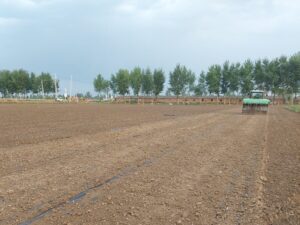
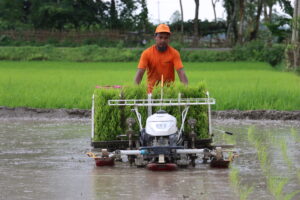

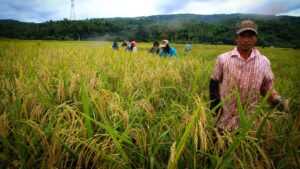
I’ve been following the Golden Rice story for years. Advocated for it on local radio when Colorado had a rediculous issue before voters. Retired old-time Plant Geneticist & college Botany prof. So happy to see your work helping humanity. Thanks.
Bob, read your interview with interest. You sure had a marvelous time at IRRI as both a scientist as well as its DG. As I recall our common days at IRRI in the 1990’s, working in a team with you was both fun and challenging, challenging in a positive sense. Your sense of humor and friendly demeanor made it easy to work together. Remember, how we took the difficult challenges of the Rainfed rice program with you as its leader?
Well, at this time all I really want to say now when you are leaving IRRI is: You did a great job. And Fauzi and I wish you and Crissan the very best in your next phase of life.
Sadiq Bhuiyan
Water Resource Scientist, IRRI (1977-2001)
Dear Sadiq,
Thanks for your kind note. I just read it now (February 16) as I did not realize comments were posted. Crissan and I are now in Portland, Oregon sorting through our decades’ accumulation of “life with rice”.
I of course remember with great fondness our early years of getting the Rainfed Lowland Program up and running. You, as Deputy PL, were an invaluable source of wisdom and institutional knowledge for a guy who was new to IRRI and all its little intricacies – chief amongst them was that you would have to be crazy to work on rainfed rice!
Well, 20 years on and as a result of the extraordinary dedication and hard work of so many scientists from IRRI and our partners we have shown that while we may have been crazy, we were not wrong! We are witnessing a transformation of rice productivity in the rainfed lowlands that I dare say surpasses our wildest dreams.
Sadiq, you were a delight to work with and opened my eyes to many different points of view with your patience and wisdom. You, Tuong and, of course Mahabub, provided me with guidance and insights that were critical to the successful launch of the rainfed lowlands program. Could you remind me again of how two irrigation specialists ended up in that program?
Please tell Parveen the next time that you see her that Crissan and I extend to her our deepest sympathies for Mahabub’s passing. I was fortunate to be able to visit with him a few months before he died. Although fatalistic about his condition, his dedication to improving the lot of Bangladeshi rice farmers was inspirational to the end.
And give our very best to Fauzi and your boys (who are no longer boys, I suppose, except in the eyes of their parents!).
All the best,
Bob